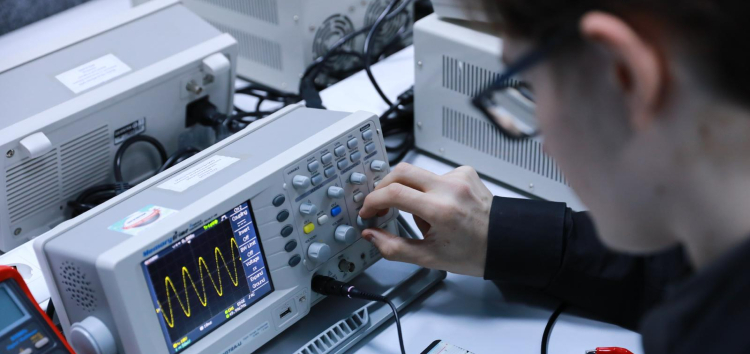
By Dilara Sarı
In a spacious classroom in Manisa, Türkiye, a group of young men and women are in the midst of an English class. They are nervous and excited, and by the look of them you may not know it, but they are out there chasing the win.
The class in question is financed by the EBRD and has been realised in partnership with Enerjisa Uretim and Manisa Celal Bayar University (MCBU) in a bid to help vocational school students gain the green skills they need for jobs in renewable energy across the nation.
Türkiye is targeting net zero emissions by 2053, which will require great effort on the part of both the private and public sectors and which the EBRD stands ready to support.
The Turkish National Energy Plan projects solar and wind energy to account for more than half of the country’s electricity generation by 2035. To achieve this, it is estimated that Türkiye will need at least US$ 75 billion in financing over the next 10 years. The EBRD has invested €2.5 billion in Türkiye’s energy sector to date, €1.7 billion of it in renewables.
In May 2023, the EBRD extended an unsecured loan of up to US$ 110 million to Enerjisa Uretim in a significant move to support Turkey’s green economy.
However, financing alone is not enough to secure a renewable transformation. By the time these investments come to fruition, the workforce will need to be equipped with the requisite green skills and knowledge to meet the growing number of new job opportunities in the sector.
With that in mind, the EBRD has been leading collaborative efforts between Enerjisa Uretim, the sector’s leading player, and MCBU academic staff to provide globally competitive training that can entice young people, particularly young women, to avail of the university’s vocational training offerings in the field. Educational and capacity-building activities, programmes and workshops on renewable energy technologies and English language classes are included in the curriculum.
A commitment to gender inclusivity and empowerment through education is enshrined in the project, and both the academics and students involved are steadfast in encouraging young women to consider choosing these classes, in a typically male-dominated industry, at an early stage.
All stakeholders keen on collaboration
The smooth running of the project is down to the close collaboration between the EBRD, MCBU and Enerjisa Uretim – as “partners, not clients”, in the words of Deputy Head of the EBRD in Türkiye Mehmet Uvez,.
Mr Uvez added: “Fostering collaboration between the private sector, technical and vocational educational institutions and universities to meet redefined workforce needs is among the strategic priorities of our Bank. I am confident that this project will contribute to the competence and diversity of the future workforce in the renewable energy sector, thereby enhancing the sector’s efficiency, performance and sustainability.”
While the EBRD has played a pivotal role in financing and guiding the strategic direction of the project, the efforts of Enerjisa Uretim have been crucial in defining industry standards and the practical requirements involved.
MCBU has been the cornerstone of the project, through its Vocational School of Technical Sciences, which has become home to the students who will benefit directly from this initiative, providing not just physical space for the training sessions, but also the academic environment to foster learning and innovation.
The outcome will benefit all stakeholders. The young people of Manisa, and Türkiye more broadly, are now taking their first steps to becoming competent, competitive drivers of a sustainable and green future for the country, accelerating its green transition.
In other words, they may be chasing the wind today, but soon, they will know how to tame it.



